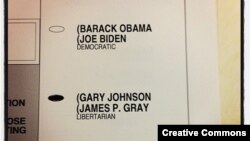Social media and camera phones may spell the end of the secret ballot.
In American election history, secret ballots only became the most accepted form of voting in the late 19th century, mainly seen as a way to ensure a vote was cast free of external influence.
These days, Americans seem eager to let the world know how they voted. According to a Pew Internet & American Life Project report released yesterday, one in five Americans is tweeting or facebooking who they voted for. Searching the popular photo sharing service Instagram revealed over 650,000 photos tagged #vote.
Most of them were of people proudly displaying the popular “I voted” stickers handed out at many polling sites, but some went a step further and posted pictures of their supposedly secret ballot--with the votes filled in.
That’s fine in some states, but in others, namely Florida, Georgia, Kentucky, Nevada, North Carolina, Texas and West Virginia, it’s illegal, according to the Citizen Media Law Center, hosted by Harvard University’s Berkman Center for Internet & Society, a research center that explores cyberspace.
At one point the social media rumor machine kicked into high gear with hundreds of messages urging people to take down pictures of their ballots because, they said, the vote might not be counted or that it was a federal offense.
Neither is true.
In American election history, secret ballots only became the most accepted form of voting in the late 19th century, mainly seen as a way to ensure a vote was cast free of external influence.
These days, Americans seem eager to let the world know how they voted. According to a Pew Internet & American Life Project report released yesterday, one in five Americans is tweeting or facebooking who they voted for. Searching the popular photo sharing service Instagram revealed over 650,000 photos tagged #vote.
Most of them were of people proudly displaying the popular “I voted” stickers handed out at many polling sites, but some went a step further and posted pictures of their supposedly secret ballot--with the votes filled in.
That’s fine in some states, but in others, namely Florida, Georgia, Kentucky, Nevada, North Carolina, Texas and West Virginia, it’s illegal, according to the Citizen Media Law Center, hosted by Harvard University’s Berkman Center for Internet & Society, a research center that explores cyberspace.
At one point the social media rumor machine kicked into high gear with hundreds of messages urging people to take down pictures of their ballots because, they said, the vote might not be counted or that it was a federal offense.
Neither is true.






